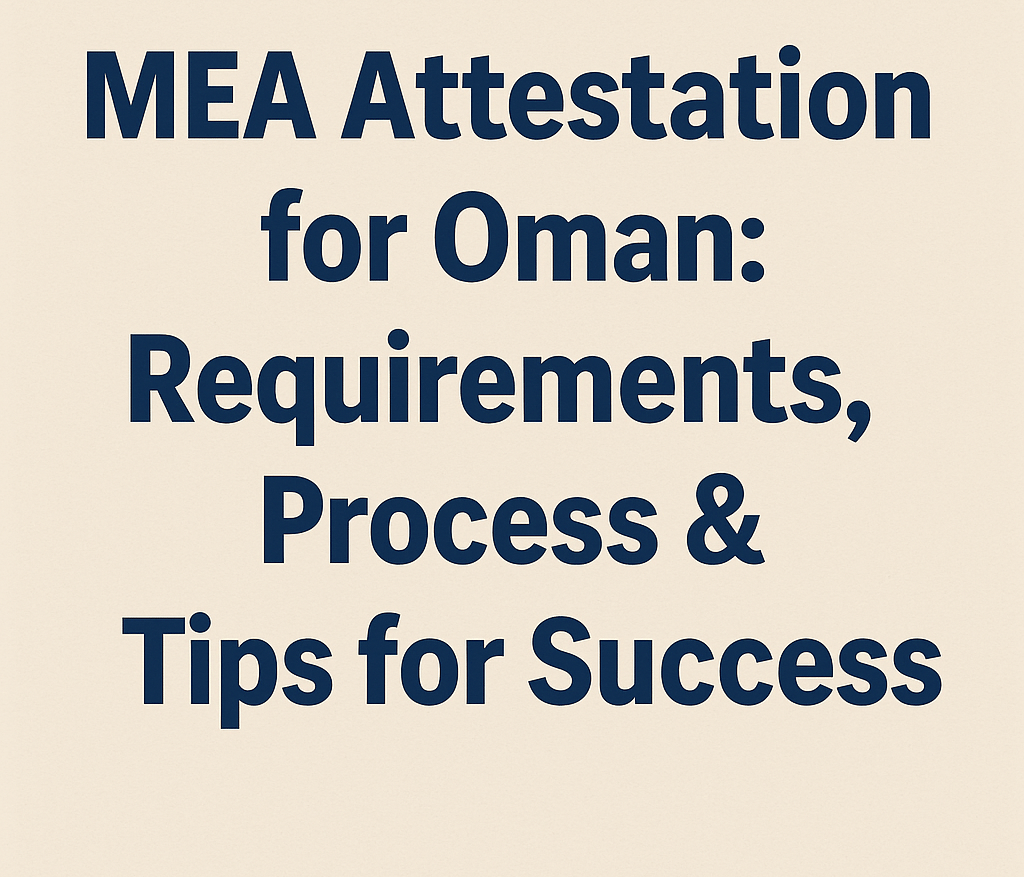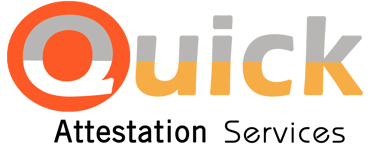Simplified Guide to MEA Attestation
Discover a comprehensive yet simplified guide to MEA attestation for educational, personal, and commercial documents. Learn the essential steps and requirements for a smooth attestation process.
8/19/20254 min read


Understanding MEA Attestation
The Ministry of External Affairs (MEA) attestation is a crucial process designed to validate documents intended for use outside the borders of India. This procedure ensures that a document is genuine and serves as a reliable form of identification or verification in foreign jurisdictions. The MEA plays a pivotal role in facilitating international relations by verifying the authenticity of documents such as educational certificates, marriage licenses, and commercial papers, ensuring they meet the legal requirements of the destination country.
Typically, documents that require MEA attestation fall into several categories: educational, personal, and commercial documents. Educational documents may include degrees, diplomas, and transcripts, which are often required when applying for higher studies, employment, or professional licensing abroad. Personal documents such as birth certificates, marriage certificates, and death certificates may also necessitate attestation for various legal purposes, such as immigration processes or settling estates. Additionally, commercial documents like Memoranda of Association and contracts are essential for businesses engaging in international trade, assuring partners and clients of their legitimacy.
The necessity of MEA attestation cannot be overstated, as it significantly impacts various contexts, particularly education, employment, and business transactions. For individuals seeking to study or work overseas, attested documents not only validate their qualifications but also enhance their credibility in the eyes of potential employers or educational institutions. In the realm of business, having properly attested documents can facilitate smoother negotiations and strengthen business relationships, thereby fostering a trustworthy environment for international trade. Overall, understanding the MEA attestation process is essential for anyone planning to utilize documents beyond India's borders.
The Process of Attestation for Educational Documents
The process of attesting educational documents involves several important steps to ensure their validity and authenticity. Commonly attested educational documents include degrees, diplomas, transcripts, and certificates. The attestation process is crucial for individuals seeking to study abroad, apply for jobs in foreign countries, or demonstrate the legitimacy of their educational qualifications.
Firstly, applicants must gather the relevant educational documents that require attestation. These may include original degrees, supporting transcripts, and any other pertinent qualifications. It is essential to ensure that these documents are clear, legible, and printed on official letterhead. If your documents are not in the official language of the destination country, certified translations may also be necessary.
The next step involves verifying the authenticity of these documents with the issuing educational institution. Institutions typically require an application form, along with the documents, to begin this verification process. Some universities or colleges may also charge verification fees, and applicants should be prepared for potential waiting periods depending on the institution’s processing times.
Once the educational institution has verified the documents, the next phase involves obtaining attestation from relevant governmental bodies. In most countries, educational documents must be attested by the Ministry of Education, and subsequently, by the Ministry of Foreign Affairs or equivalent authority. This ensures that the documents are recognized at both national and international levels.
Lastly, it is recommended to engage a professional service or consultant that specializes in document attestation, as they can facilitate the process and help navigate the bureaucratic complexities. This is especially beneficial in understanding the fees involved, which can vary depending on the institutions and authorities involved.
Attestation for Personal and Commercial Documents
Attestation is a crucial process for both personal and commercial documents, serving to validate their authenticity. For personal documents, such as marriage certificates, birth certificates, and various legal papers, the attestation process assures that these important records are recognized by foreign authorities. This is particularly significant for expatriates and individuals planning to relocate or conduct business internationally. The validity of personal documents can often be essential when applying for visas, family reunification, or other legal transactions, and having them properly attested can prevent potential issues.
On the commercial side, attestation plays a vital role in international trade and commerce. Business contracts, agreements, and certificates of incorporation often need to be attested to affirm their authenticity. Businesses planning to operate internationally must ensure that their commercial documents are validated to establish trust with foreign partners and comply with local regulations. An attested commercial document demonstrates a company's legitimacy and can be crucial in negotiations, trade agreements, and legal situations.
The attestation process generally involves several steps. Initially, documents must be verified by the relevant governmental authority in the home country. For personal documents, this typically includes a notary public or local government office. After this, documents may need to be submitted to a Ministry of Foreign Affairs or equivalent agency for further validation. Finally, documents may need to be attested by the embassy or consulate of the country where the documents will be used. This multi-tier process can vary depending on the countries involved and the specific type of document being attested.
Engaging with professionals who specialize in document attestation can simplify this process significantly. By understanding the importance of attestation for both personal and commercial documents, individuals and businesses can better navigate the complexities of international requirements and ensure their documents are legally accepted abroad.
Tips and Common Mistakes to Avoid
Navigating the attestation process can be challenging, particularly for educational, personal, and commercial documents. To ensure efficiency, it is crucial to prepare adequately and to be aware of common pitfalls that can cause delays or complications. First and foremost, check your documents for authenticity before initiating the attestation process. Falsified or incorrect documents can not only lead to rejection but also pose legal risks.
One frequent mistake is not verifying the requirements set forth by the Ministry of External Affairs (MEA) or relevant authorities. Each type of document may have different guidelines, and failing to adhere to these can result in unnecessary delays. Therefore, it is advisable to compile a checklist of prerequisites related to the specific documents you intend to get attested. This may include notarization or obtaining prior approval from various departments.
Additionally, individuals often overlook the necessity of obtaining translations for certain documents. For example, if your educational certificates are not in the official language of the country where you are seeking attestation, ensure you have certified translations prepared beforehand. This minimizes the risk of encountering issues during the process, making it smoother and more efficient.
Another common error is underestimating the time required for attestation. Many individuals assume the procedure will be quick, but processing times can vary significantly depending on the document type and the MEA's workload. Therefore, it is prudent to plan well in advance, especially if you need the documents for specific purposes like employment, further education, or business ventures.
Lastly, staying updated on regulatory changes regarding attestation is vital. The requirements can evolve, and remaining informed ensures you are always prepared. By following these practical tips and being cautious of common mistakes, you can streamline the attestation process, securing the necessary approvals in a timely manner.
Expert
Your trusted partner for document attestation services.
Contact NOw:
Support
+91 9210776391
© 2025. All rights reserved.
